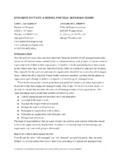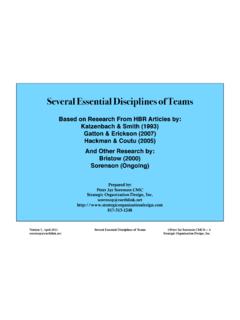Transcription of Managing a Payroll Department
1 Managing a Payroll Department 1 01/24/2013 Topics Basic Management Theory Management Skills Management Issues Management Styles Research Needs Policies and Procedures 01/24/2013 2 Managing a Payroll Department Basic Management Theory Payroll managers in mid-size and large organizations are responsible for: Planning Staffing Training Evaluating Counseling Delegating Recognizing Reporting .. and so on 3 01/24/2013 01/24/2013 4 Managing a Payroll Department Basic Management Theory Delegating oBroken down into three components: Responsibility lies with the individual who is assigned to get the job done Authority needed to get the job done, should be well defined Accountability can never be delegated to the staff, managers are accountable for the work that is performed by their subordinates oBenefits Get more done through the efforts of others Developing others Help make yourself replaceable 5 Managing a Payroll Department Basic Management Theory Situational Leadership *Paul Hersey, Ken Blanchard, and Dewey Johnson noted that the way managers handled their staffs often depended on the way they dealt with two factors: tasks and relationships.
2 Task Behavior (guidance) oEmphasize control over lines of communication, work procedures, and patterns of organization Relational Behavior (support) oPlace few restrictions on communication and staff and seek their support and friendship oPush employees to accept responsibility and reach their full potential *Management of Organizational Behavior: Leading Human Resources (8th Edition), Prentice Hall, Engelwood Cliffs, NJ, 2000 01/24/2013 6 Managing a Payroll Department Basic Management Theory Hersey and Blanchard concluded that the different combinations of these factors led to four different management styles. Low Task / High Relationship little control sought by the manager; good deal of mutual trust and support High Task / High Relationship manager controls the job and procedures; also relies on personal communication with employees to coach them in performing the job Low Task / Low Relationship most jobs delegated to staff; little personal contact desired by manager High Task / Low Relationship manager seeks to control staff and direct performance; but with little feedback or dialogue with employees Use the style that fits the demands of the particular job or function and the employee or group of employees seeking to accomplish it.
3 01/24/2013 01/24/2013 7 Managing a Payroll Department Basic Management Theory Principle-Centered Leadership *Developed by Stephen Covey - Deals with four fundamental dimensions which grow out of leadership centered on principles such as integrity, justice, and the Golden Rule which become the internal sources of an organization s strength. Security collective sense of strength and self-esteem felt by professionals who work in an organization Guidance the direction on which we base our decisions and actions Wisdom the ability to maintain balance and perspective among the diverse internal and external forces that influence the organization s reality Power the energy to decide, to act, and to change *Principles-Centered Leadership, Simon & Schuster, New York, NY, 1990 01/24/2013 8 Managing a Payroll Department Basic Management Theory Empowerment Key objective is for the employee to take ownership of a process, leading to a motivated, effective, and responsible employee who derives satisfaction from being allowed to develop their own methods to accomplish an objective The empowerment process involves five steps: oStep 1: Establish the desired results oStep 2: Provide guidance oStep 3.
4 Identify resources available to accomplish the task oStep 4: Hold people accountable oStep 5: Identify consequences 01/24/2013 9 Managing a Payroll Department Basic Management Theory Todays workforce has workers from more diverse backgrounds than ever before. The ability to manage the diverse workforce successfully requires that managers be flexible and use the management style for each situation that will get the most out of the employee and the most for the organization. 01/24/2013 10 Managing a Payroll Department Management Skills Fundamental Skills Strategic Planning and Organizing oConsists of several key activities, including: Defining goals and objectives Defining the time frame Defining the subtasks Analyzing available resources Evaluating costs Staffing oSupervisory portion of a manager s duties with skills that include: Hiring the right employees Training to improve skills and knowledge Delegating tasks and responsibilities Coaching employees by observing and offering suggestions for improvements 01/24/2013 11 Managing a Payroll Department Management Skills Fundamental Skills Direct Employees in work activities (as individuals or as teams)
5 OProvide Feedback oListening oCoaching oCounseling oLeadership Having a vision Building team support Seeking partners Accepting accountability Making decisions and taking action Leading by example 01/24/2013 12 Managing a Payroll Department Management Skills Fundamental Skills Controlling Performance to meet the stated objectives and mission oSet standards to meet specific and measurable goals oMonitor actual progress oCompare progress with standards oTake corrective actions if progress toward standard is not sufficient oMotivators to spur employees to better performance can include: Money Achievement Leadership Affiliation Recognition 01/24/2013 13 Managing a Payroll Department Management Skills Fundamental Skills Reporting oCommunicate with immediate supervisor, other Department heads, and executive management oImportant points to keep in mind when reporting: Include only information the person using it needs to make a decision Provide the report in time for decisions based on the information provided to be made Write clearly and be brief whenever possible Leave out the Payroll jargon oBecause employee salaries and benefits comprise a significant expense for any business, the need for information about changes in the business (event-based management) and the speed of turn-around are critical to making the right business decisions and to setting a clear strategic vision for the future 01/24/2013 14 Managing a Payroll Department Management Issues Conducting and Attending Meetings Meetings are an important vehicle for managers to make their ideas known and to show their leadership ability oGuidelines for conducting meetings.
6 Plan according to the type of meeting Prepare for the meeting Keep the meeting on track Promote participation Keep a written record of the meeting 01/24/2013 15 Managing a Payroll Department Management Issues Keep Written Policies and Procedures Time and money spent on documentation will pay off in higher quality service to employees, government agencies, and upper management oItems that should be documented are: Company policies on overtime, benefits, vacations, sick leave, terminations, recordkeeping, etc. Procedures for handling Payroll , tax deposits, quarterly returns, liabilities, direct deposit, account reconciliations, etc. All aspects of, and tasks involved in, the Payroll process from beginning to end Disaster recovery plans (business continuity) Payroll computer system user manuals Payroll Department job descriptions File descriptions 01/24/2013 16 Managing a Payroll Department Management Issues Crisis Management A crisis is any event that has a direct impact on the Department s and organization s ability to accomplish its objectives oPrecautionary measures a Payroll manager can take to minimize the chances that a crisis will occur.
7 Make sure the tools are available to do the job Plan and schedule for the worst case scenario Make sure there is a back-up for all your systems Maintain an open communication network Cross train Payroll personnel Conduct a regular review of all Department policies, procedures, and documentation Deal promptly and effectively with issues that adversely affect employee attitudes and morale Conduct a regular and comprehensive review of all Payroll Department output Keep your priorities flexible 01/24/2013 17 Managing a Payroll Department Management Issues Crisis Management Manage or control a crisis oSteps to consider to minimize damage to the Department s mission of quality service when a crisis occurs: Present a calm, cool exterior to the employees Control and isolate the crisis and the people who will deal with it Tackle the problem at hand and do not worry about what went wrong in creating the crisis Analyze the situation for multiple solutions and rank them from an overall business perspective Keep the lines of communication open Determine the appropriate course of action and initiate decisive action and their responsibilities in carrying it out Document and carefully monitor the progress of the plan to resolve the crisis Document the results of the crisis and the action taken to deal with it When the crisis is over express your appreciation to all concerned 01/24/2013 18 Managing a Payroll Department Management Issues Crisis Management After the crisis lessons learned oSteps to consider the lessons it taught are not forgotten.
8 Conduct a meeting with the team to discuss the crisis and determine which of the problems that occurred were preventable Initiate a plan to prevent these problems from reoccurring List the successful results of the crisis management operation and include them in a Crisis File for future reference List all issues that were not successfully resolved and formulate procedures to resolve them Express your appreciation to your staff once again for their hard work during the crisis 01/24/2013 19 Managing a Payroll Department Management Issues Crisis Management Extracting positives from the crisis oThere are several ways to take something positive away from a crisis situation, including: Meeting with your manager to discuss the crisis and the outcome, new controls and procedures to prevent future crises, the performance of the Payroll Department staff, and any changes in working conditions or tools that might be needed Share your experiences with other Payroll professions and find out how they solved similar problems Assess your staff and take note of those who displayed outstanding skills under stress Assess your own performance during the crisis and work toward improving your weaker skills Follow through to ensure all new procedures have been implemented and tested Use the opportunity of the crisis to build on the team spirit of the Payroll Department staff 01/24/2013 20 Managing a Payroll Department Management Issues Time Management Managers must find time to do the things they were hired or promoted to do plan, organize, develop, evaluate, measure, etc.
9 ODemands on a manger s time are categorized as follows: Urgent and important crisis management, immediate attention needed Not urgent but important planning and prevention activities Urgent but not important pressing activities that may be easy to accomplish Not urgent and not important easily accomplished, time wasting activities Prioritize duties and responsibilities so enough time is spent in the not urgent but important quadrant, which includes the activities of planning and prevention, the real management activities 01/24/2013 21 Managing a Payroll Department Management Issues Time Management Scheduling and delegating keys to time management oSchedule your activities oEffective delegation of tasks to others in the Department Controlling your e-mail oCheck e-mail at certain times of the day Let others in the organization know so that immediate answers are not expected oDo not check e-mail when you first get to work Leads to long session of handling easy but unimportant and time-consuming tasks knocks you of your schedule before you get started 01/24/2013 22 Managing a Payroll Department Management Issues Team Building Successful teams can increase productivity, use resources more effectively, reduce costs while improving quality.
10 And make better use of innovation to solve problems because of the increased commitment and involvement of the team members Four stages of team development (adapted from Tuckman s Team Development Model) oForming - In the first stages of team building, the forming of the team takes place oStorming The group will next enter the storming stage in which different ideas compete for consideration oNorming - The team manages to have one goal and come to a mutual plan for the team oPerforming - High-performing teams are able to function as a unit as they find ways to get the job done smoothly and effectively without inappropriate conflict or the need for external supervision 01/24/2013 23 Managing a Payroll Department Management Issues Team Building Managing different employee styles oContributors willing to share their expertise and information and are organized and dependable oCollaborators flexible and open and believe in broad participation by team members oCommunicators excellent communication skills, often the peacekeepers during team meetings, maintain a positive approach.


![Multistate Payrolls.ppt [Read-Only]](/cache/preview/b/6/1/5/8/4/3/5/thumb-b6158435e94885e37ea9ee9811ea55ed.jpg)







